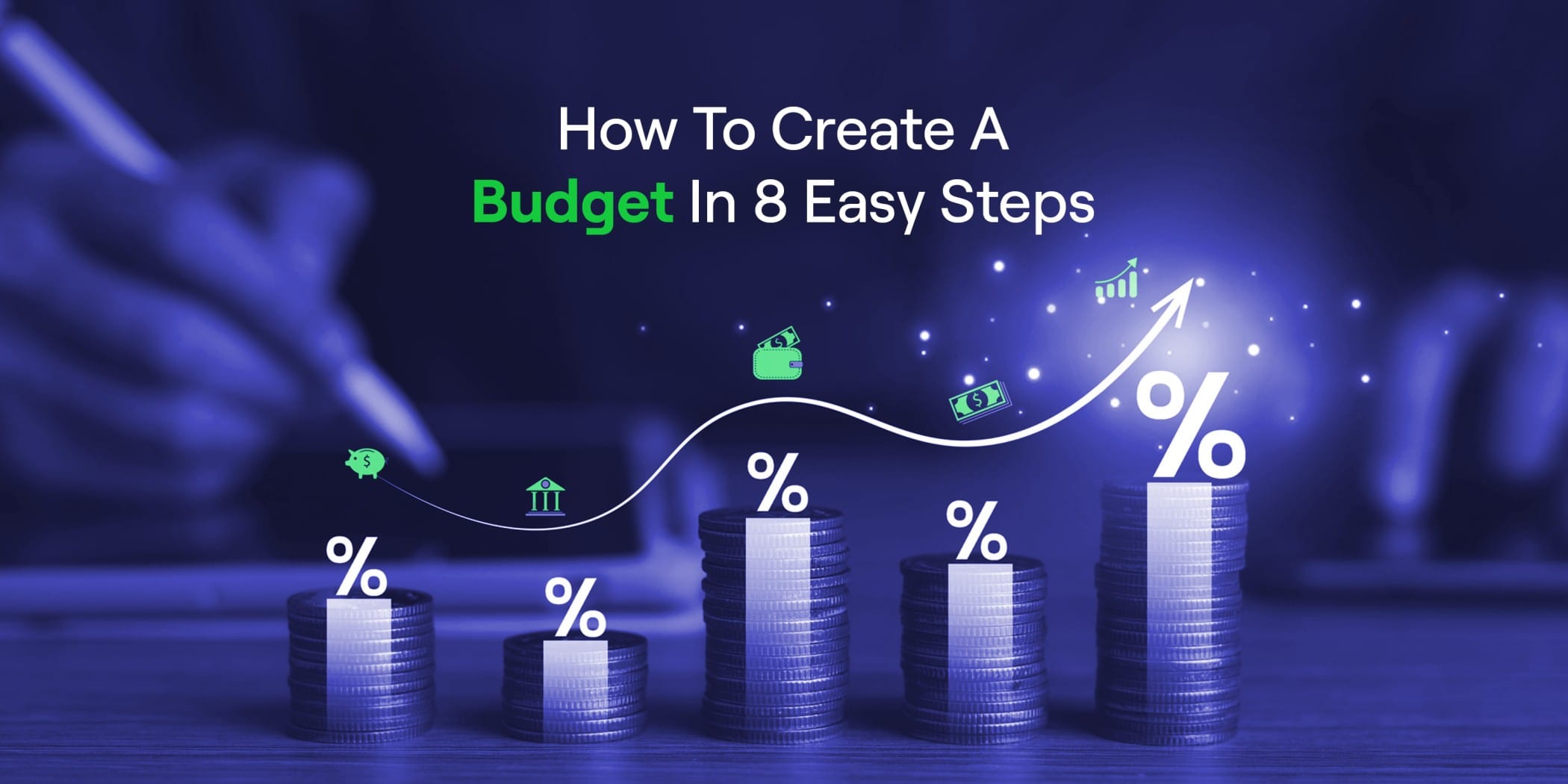
How to Create a Budget in 8 Easy Steps (and Actually Stick to It!)
Money Troubles Got You Tossing and Turning at Night?
We've all been there – that nagging worry about bills, that sinking feeling when you check your bank balance or the constant mental juggling act of trying to make ends meet. If you're tired of feeling like your finances are controlling you, it's time to take the reins and create a budget that works.
Picture this: no more late-night anxiety spirals, no more wondering where your paycheck disappeared to, and no more sacrificing your dreams because of money constraints. Budgeting isn't about restricting yourself; it's about empowering yourself to make informed choices and achieve your financial goals.
But don't worry, you don't need a finance degree or a complicated spreadsheet to start. In this post, we'll guide you through an 8-step budgeting process that's so simple and effective that you'll wonder why you didn't do it sooner. Ready to learn how to create a budget? Let's dive in!
Here Is How to Create a Budget in 8 Easy Steps
- Calculate Your Net Income
- List Your Fixed Expenses
- List Your Variable Expenses
- Track Your Spending
- Categorize Your Expenses
- Set Spending Limits
- Review and Adjust
- Set Financial Goals
1. Get Real About Your Income (The Net, Not the Gross)
Before you dive into budgeting, knowing exactly how much money you're working with each month is crucial. We're talking about your net income, not the exciting (but misleading) gross salary you see on your offer letter.
Why net income matters:
- Accurate Budgeting: Your net income is the foundation of your budget. It determines how much you can realistically allocate to various expenses.
- Avoid Overspending: Budgeting based on gross income can lead to overspending and financial surprises.
- Financial Clarity: Knowing your net income gives you a clear picture of your financial reality.
How to calculate your net income:
- Start with your gross salary: This is your total earnings before deductions.
- Subtract taxes: This includes federal and state income taxes and any local taxes.
- Subtract deductions: This can include contributions to your pension, health insurance premiums, and other deductions.
- The result is your net income: This is your take-home pay, the amount you have available to spend and save.
Helpful resources:
- Online calculators: Many online calculators can help you estimate your net income based on your gross salary and location.
- Financial advisor: If you have a complex financial situation, a financial advisor can help you accurately calculate your net income.
Remember: Your net income is your starting point for budgeting. Be honest with yourself about this figure, and you'll set yourself up for financial success.
Related Post: Importance of High-Interest Savings Accounts in Nigeria
2. List Your Fixed Expenses
Now that you know your net income, it's time to confront the big players in your budget: your fixed expenses. These are the recurring costs that remain relatively consistent from month to month, like loyal soldiers guarding your finances.
What are fixed expenses?
- Rent: Monthly payments for your apartment or house.
- Electricity: This includes both the prepaid meter recharge and any estimated bills.
- Water Bill: Monthly charges for water usage, if applicable.
- Waste Disposal: Fees for waste collection and disposal services.
- School Fees: If you have children, school fees are a significant fixed expense.
- Car Loan or Hire Purchase Payments: Monthly instalments on your vehicle.
- Transportation: Regular costs like fuel, bus fares, or transport to and from work.
- Debt Repayments: This can include loans, credit card payments, or other outstanding debts.
- Phone and Internet Bills: If you have a fixed data or call plan, this falls under fixed expenses.
- Subscriptions: Regular payments for services like DSTV/GOTV, Netflix, Spotify, or gym memberships.
Why tracking fixed expenses is essential:
- Predictability: Knowing your fixed expenses lets you anticipate your monthly financial obligations.
- Budget foundation: Fixed expenses form the base of your budget. You need to cover these costs before allocating funds to other areas.
- Identify savings opportunities: By tracking fixed expenses, you might discover areas where you can cut back or negotiate better rates (e.g., refinancing a loan).
Tools for tracking fixed expenses:
- Spreadsheets: Create a simple spreadsheet to list your fixed expenses, their due dates, and the amounts.
- Budgeting apps: Many budgeting apps automatically track recurring expenses and provide helpful visualizations.
- Notebook and pen: If you prefer a low-tech approach, jot down your fixed expenses in a notebook and update it regularly.
Pro tip: While fixed expenses are generally stable, they can change over time. For example, your rent might increase, or you might decide to cancel a subscription. Review your fixed expenses regularly to keep your budget accurate.
Related Post: 5 Tips for Safely Sending Money Abroad

3. List Your Variable Expenses
Now that you've tamed the titans of fixed expenses, it's time to round up the wildcards: your variable expenses. These are the costs that tend to change from month to month, like unpredictable weather patterns in your financial forecast.
What are variable expenses?
- Groceries: The cost of feeding yourself and your family can vary depending on your eating habits, dietary needs, and grocery store choices.
- Dining out: Eating at restaurants, ordering takeout, or grabbing coffee can quickly add up if not monitored.
- Entertainment: Movies, concerts, sporting events, hobbies, and other leisure activities all fall under this category.
- Personal care: Haircuts, cosmetics, toiletries, and clothing purchases can vary based on your needs and preferences.
- Transportation: Gas, car maintenance, parking fees, and ride-sharing services can fluctuate depending on your usage.
- Utilities: While some utilities are fixed (like your internet plan), others, like electricity and water, can vary with usage.
Why tracking variable expenses is crucial:
- Spot overspending: Variable expenses are often the culprits behind budget overruns. Tracking them helps you identify areas where you might be spending more than you realize.
- Control your spending: By monitoring your variable expenses, you can make conscious choices about where to allocate your money and where to cut back if needed.
- Budgeting accuracy: Accurately tracking variable expenses allows you to create a realistic budget that reflects your actual spending patterns.
Tips for tracking variable expenses:
- Save receipts: This is the simplest way to track your spending. Keep your receipts and review them at the end of each week or month.
- Use a spending tracker app: Many apps can help you track your expenses by category and provide helpful insights into your spending habits.
- Set spending limits: Allocate a specific amount of money to each variable expense category and stick to it. This can help you avoid impulse purchases and stay on budget.
- Review your bank and credit card statements: This will give you a comprehensive overview of your spending and help you identify any recurring variable expenses you might have missed.
By managing your variable expenses, you'll gain valuable control over your finances and be one step closer to achieving your budgeting goals.
Related Post: How to Save Money In 2024
4. Become a Detective: Track Your Spending
Alright, budgeting sleuths, it's time to put on your detective hats and follow the money trail. This step involves tracking your spending habits for a short period, like a week or two. Think of it as your financial reconnaissance mission.
Why track your spending?
- Uncover spending patterns: Do you have a latte habit that's draining your wallet? Are those impulse buys adding up? Tracking your expenses reveals your spending patterns, both good and bad.
- Identify areas for improvement: Once you see where your money is going, you can pinpoint areas where you can cut back or make smarter choices.
- Create a realistic budget: Tracking your spending gives you the data you need to create a budget that actually reflects your lifestyle.
How to track your spending:
- The old-school way: Grab a notebook and pen and jot down every expense, no matter how small. Include the date, amount, and category (e.g., food, entertainment, transportation).
- Tech-savvy tracking: Numerous apps and online tools can help you track your spending automatically. Some even link to your bank account or credit cards for effortless tracking.
- Spreadsheet superhero: Create a simple spreadsheet to categorize your expenses and track your spending over time. This can be a great way to visualize your progress and identify trends.
What to expect when tracking your spending:
- Surprises (good and bad): You might be surprised by how much you spend on certain categories or how little you spend on others. This information can be valuable for adjusting your budget.
- Increased awareness: Tracking your spending makes you more mindful of your financial choices, which can lead to better spending habits in the long run.
- A sense of control: By understanding where your money goes, you gain a sense of control over your finances and can make informed decisions about your spending.
Pro tip: Don't judge yourself during this process. Tracking your spending is about gathering information, not beating yourself up over your past choices. Remember, this is just the first step towards creating a budget that works for you.
Related Post: Understanding the Impact of the 2024 Bitcoin Halving

5. Organize the Chaos: Categorize Your Expenses
Now that you've gathered information on your spending habits, it's time to organize the chaos by categorizing your expenses. Think of it as sorting laundry—separating socks from shirts makes everything easier to manage.
Why categorize expenses?
- See the big picture: By grouping your spending into categories, you can easily see where your money is going. This reveals which areas are consuming the most of your budget.
- Identify problem areas: Is your dining out category suspiciously bloated? Are you spending more on entertainment than you realized? Categorizing expenses helps you pinpoint areas where you might need to cut back.
- Track progress over time: Categorizing allows you to compare your spending from month to month and see if you're making progress towards your financial goals.
- Make informed decisions: Knowing where your money is going can help you make more informed decisions about your spending priorities.
Common expense categories:
- Housing (rent/mortgage, utilities, maintenance)
- Transportation (car payments, gas, insurance, public transport)
- Food (groceries, dining out, takeout)
- Entertainment (movies, concerts, hobbies)
- Personal care (haircuts, cosmetics, toiletries)
- Healthcare (insurance premiums, doctor visits, prescriptions)
- Debt payments (loans, student loans, credit card payments)
- Savings (emergency fund, retirement contributions)
Customize your categories:
- Tailor categories to your lifestyle: If you own a pet, create a "Pet care" category. If you have children, create categories for "Childcare" and "Education."
- Be as specific as you want: You can create broad categories like "Entertainment" or get more granular with categories like "Movies," "Concerts," and "Books."
- Use subcategories: If you have a large expense category like "Food," you can create subcategories like "Groceries," "Dining Out," and "Takeout" for more detailed tracking.
Accuracy is key:
- Don't misclassify expenses: If you buy groceries and cleaning supplies on the same trip, make sure to allocate the spending to the correct categories.
- Review your spending regularly: Make it a habit to review your categorized expenses each week or month to ensure accuracy and identify any errors.
By categorizing your expenses, you'll transform a jumbled mess of transactions into a clear and organized financial picture. This will be your roadmap to creating a budget that works for you and achieving your financial goals.
Related Post: Discover the Top 7 Memecoins to Buy in 2024
6. Draw the Lines: Set Spending Limits
Congratulations, budget master! You've made it to the exciting part: setting spending limits for each category. This is where you take control of your money and tell it where to go. Think of it as giving each expense category its own little allowance.
How to set spending limits:
- Start with your net income: This is the total amount of money you have to work with.
- Allocate percentages to each category: A popular guideline is the 50/30/20 rule:
- 50% for Needs: Essentials like housing, food, transportation, utilities, and healthcare.
- 30% for Wants: Non-essential expenses like dining out, entertainment, hobbies, and personal care.
- 20% for Savings: This includes debt payments, emergency fund contributions, and investments for the future.
Example with a ₦200,000 net income:
- Needs: ₦100,000
- Wants: ₦60,000
- Savings: ₦40,000
Adjusting the framework:
- The 50/30/20 rule is a guideline, not a strict rule. You can adjust the percentages to fit your individual circumstances and financial goals.
- High housing costs: If your rent or mortgage payment is higher than average, you might need to allocate more than 50% of your income to your "Needs" category.
- Debt repayment: If you have a lot of debt, you might want to allocate more than 20% of your income to your "Savings" category to accelerate your debt repayment.
- Personal priorities: If you value travel or hobbies, you might choose to allocate more of your "Wants" budget to those areas.
Tips for setting spending limits:
- Be realistic: Don't set limits that are so strict that you can't stick to them. It's okay to indulge in some "wants" as long as you stay within your budget.
- Track your spending: Once you've set spending limits, track your spending to see if you're staying on track. You might need to adjust your limits if you're overspending in certain categories.
- Review and adjust: Your budget isn't set in stone. Life changes, and so do your expenses. Review your budget regularly and make adjustments as needed.
By setting spending limits for each category, you're creating a roadmap for your money and gaining valuable insights into your spending habits and priorities. This is crucial in taking control of your finances and building a brighter financial future.
Related Post: What Causes Cryptocurrency Prices to Rise and Fall

7. Don't Just Set It and Forget It: Review and Adjust
Congratulations! You've officially created a budget. But hold on – the journey isn't over yet. Your budget isn't a one-and-done deal; it's a living document that needs regular check-ups and adjustments.
Why review your budget?
- Life is dynamic, not static. Your income, expenses, and financial goals can change over time, and your budget should evolve along with them.
- Catch problems early: Regular reviews help you spot potential issues, like overspending in certain categories before they become bigger problems.
- Stay motivated: Seeing your progress and adjusting your budget as needed can help you stay motivated and on track towards your financial goals.
How often should you review your budget?
- Monthly: This is a good starting point for most people. It allows you to track your spending patterns and make adjustments as needed.
- Quarterly: If your income or expenses fluctuate significantly, you might want to review your budget more frequently, like every three months.
- Annually: At the very least, review your budget annually to ensure it aligns with your financial goals and overall financial situation.
Analyzing your spending:
- Compare your spending to your budget: Look at how much you actually spent in each category compared to your budgeted amount. Identify areas where you overspent or underspent.
- Identify patterns: When do you tend to overspend at certain times of the month? Are there certain expenses that always seem to be higher than you expect?
- Look for areas to improve: Based on your analysis, identify areas where you can cut back or adjust your spending limits.
Embracing flexibility:
- Your budget is a tool, not a straitjacket: Don't be afraid to adjust your budget as needed. You might want to increase your savings goal if you get a raise. You might need to cut back on your "wants" spending if you have unexpected expenses.
- Life happens: Don't beat yourself up if you don't adhere to your budget perfectly every month. The important thing is to learn from your mistakes and keep moving forward.
Remember, budgeting is a journey, not a destination. Regularly reviewing and adjusting your budget ensures that it remains a valuable tool for achieving your financial goals and building a secure financial future.
Related Post: How To Save Your Money In Dollars With USDT
8. Aim High: Set Financial Goals
You've laid the groundwork, tracked your spending, and set limits – now it's time to dream big! Setting financial goals is the fuel that propels your budget from a spreadsheet to a roadmap for your future.
Why set financial goals?
- Motivation: Goals give your budget purpose and meaning. They provide a reason to stick to your spending plan and make sacrifices when necessary.
- Direction: Goals help you focus your financial efforts. Instead of just saving money, you save for a specific purpose, like a down payment on a house or a dream vacation.
- Achievement: Seeing yourself reach financial milestones can be incredibly rewarding and motivating. It reinforces positive habits and keeps you moving forward.
How goals shape your budget:
- Prioritization: When you have a clear goal, you can prioritize your spending accordingly. If saving for a wedding is your top priority, you might cut back on dining out or entertainment.
- Accountability: Goals hold you accountable to your financial plan. They provide a benchmark against which you can measure your progress.
- Flexibility: Your goals can evolve over time, and your budget should adapt along with them. As you achieve one goal, you can set new ones that align with your changing priorities.
Examples of SMART financial goals:
- Specific: "I want to save ₦500,000 for a down payment on a house."
- Measurable: "I will save ₦20,000 per month to reach my goal."
- Achievable: "I will cut back on dining out and entertainment to free up money for savings."
- Relevant: "Owning a home is important to me and my family."
- Time-bound: "I will save ₦500,000 within 2 years."
Are you interested in dipping your toes into the exciting world of cryptocurrencies? Then consider this SMART financial goal as a starting point:
Here's a SMART Financial Goal Related To Trading Crypto:
- Specific: "I want to grow my cryptocurrency portfolio by 15% in the next 6 months by actively trading on Busha."
- Measurable: "I will track my portfolio's value weekly and adjust my trading strategy as needed."
- Achievable: "I will set aside ₦10,000 each month for cryptocurrency investments."
- Relevant: "I believe in the potential of cryptocurrencies and want to diversify my investment portfolio."
- Time-bound: "I will achieve a 15% portfolio growth within 6 months from today."
Conclusion On How to Create a Budget in 8 Easy Steps
Congratulations, budgeting champion! You've completed the eight steps to crafting a budget that truly works for you, and now you know how to create a budget. Let's recap this empowering journey:
- Calculated Your Net Income: You got real about your take-home pay, the true foundation of your budget.
- Listed Fixed Expenses: You identified the recurring costs that shape your financial landscape.
- Listed Variable Expenses: You acknowledged the wildcards in your spending patterns.
- Tracked Your Spending: You became a financial detective, uncovering hidden habits and insights.
- Categorized Expenses: You brought order to the chaos, grouping your spending for clarity.
- Set Spending Limits: You took charge, allocating resources to each category and reclaiming control.
- Reviewed and Adjusted: You embraced flexibility, knowing life happens and your budget should adapt.
- Set Financial Goals: You envisioned your future, setting goals that inspire and guide your financial choices.
By completing these steps, you've created a budget and embarked on a transformative journey towards financial well-being. Budgeting isn't about deprivation but empowerment, freedom, and achieving your dreams.
Now, it's your turn to take action. Don't let this newfound knowledge gather dust. Start implementing your budget today and watch your financial confidence soar. Remember, it's never too late to take control of your money and create a life you love.

